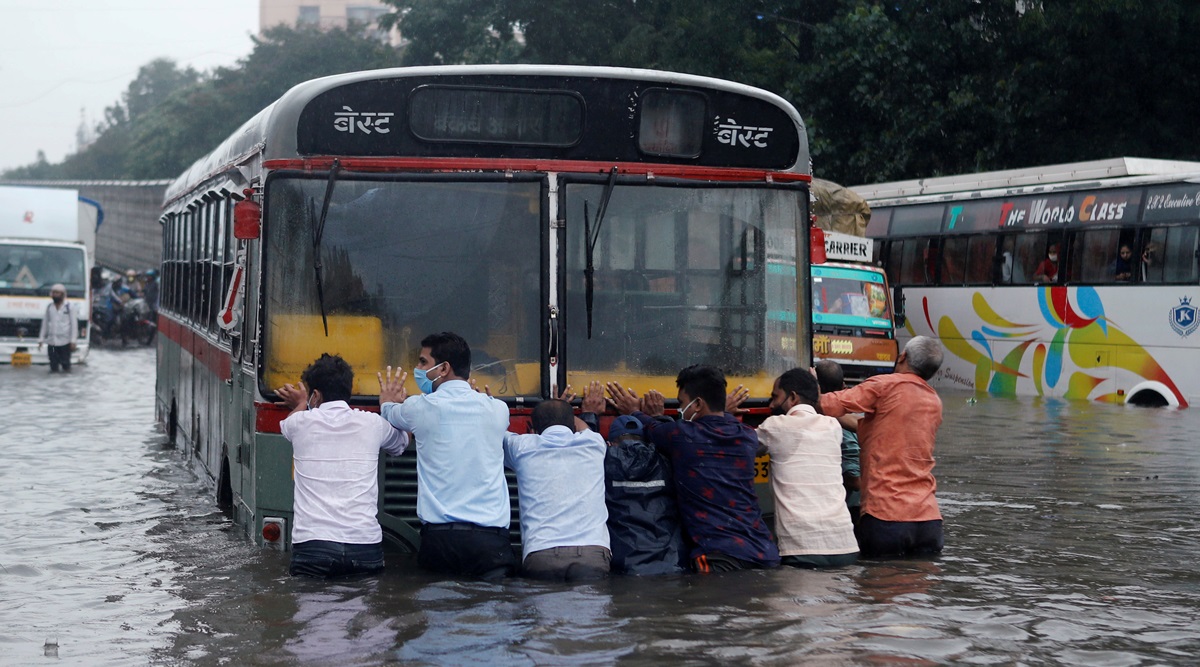Two security guards of a highrise in Agripada died after rainwater flooded the basement of the building, trapping them in an elevator.
Incessant overnight rain for almost 12 hours, followed by intermittent showers during the day, threw Mumbai out of gear on Wednesday with the city witnessing severe waterlogging that disrupted local train services and vehicular traffic.
Two security guards of a highrise in Agripada died after rainwater flooded the basement of the building, trapping them in an elevator. For the second time this year, South Mumbai, which usually doesn’t see waterlogging, saw unprecedented flooding in several parts.
Mumbai’s suburbs received the season’s most intense showers, recording 286.4 mm rain between Tuesday evening and Wednesday morning, categorised as extremely heavy rainfall. Of this, 107 mm rain was recorded over six hours on Tuesday (5.30 pm to 11.30 pm) and remaining 179.4 mm from 11.30 pm to 5.30 am, Wednesday. Colaba observatory, representative of South Mumbai, recorded 147.8 mm (very heavy) rain in 24 hours. Of this, 89 mm rain was recorded over six hours on Tuesday (5.30 pm to 11.30 pm) and the remaining 58.5 mm till 8.30 am, Wednesday.
Normal life was affected in the city as floodwaters entered residential premises in Dadar, Worli and Goregaon areas, with some areas recording waist-deep water.
The Brihanmumbai Municipal Corporation (BMC) shut down all semi-government, government and private offices (except essential services). The Bombay High Court Chief Justice declared a holiday for the High Court after severe waterlogging in the city.
Following the overnight rainfall, waterlogging complaints were received from 19 spots across the city. Several areas including Hindmata and Gandhi Market in Dadar, Sion Road 24, Andheri, Malad and Dahisar Subway, Bandra Talkies, Old Khar and Shastri Nagar, Goregaon remained in knee-deep to waist-deep water till late Wednesday afternoon. According to the civic body, Gandhi Market’s main road was opened to traffic by 3:30 pm, while the side-way remained inundated.
The BMC diverted buses from over 100 routes on Wednesday morning. Thirty BEST buses were stuck in waterlogged roads. Over 30 roads were flooded due to which BEST had to divert buses or cancel services.
Local train services were also affected due to waterlogging on the tracks. Central Railways services between Chhatrapati Shivaji Maharaj Terminus (CSMT) and Thane railway station were suspended on Wednesday morning. All four lines of Central Railways were shut from 4.20 am due to waterlogging between Dadar and Kurla stations, and Masjid Bundar, according to BMC’s disaster management department. The harbour line between CSMT and Vashi was also affected.
Western Railways also said they were suspending local train services due to waterlogging. Train services between Churchgate and Andheri railway stations were suspended, to be restored only after 4 pm.
BMC officials said extremely heavy rain with high tide reaching 4.1 metres at around 4 am, followed by neap tide at 10 am, led to excessive flooding and slow receding of floodwaters from many areas. In a neap tide, the difference between low and high tides is not much and the discharge of stormwater into the sea is very slow.
A retaining wall abutting the hillside in Khareghat Parsi Colony at Huges Roads near Bablunath collapsed and mud entered flats on the ground floor of a two-storey building. No residents were injured in the incident. However, as the mud was still loose, as a precautionary measure, the civic body asked the ground and first-floor residents to vacate their flats.
Meanwhile, the BMC evacuated at least 50 residents living around the banks of Mithi river at Kranti Nagar, Kurla, around 6 am as the water levels crossed the 3.3-metre mark. A civic official from BMC’s disaster management department said, “Water receded by 8 am, and a few people returned home. The situation is under control.”
According to the BMC, eight wall collapses, 12 tree-fall incidents and 40 short circuit complaints were registered across the city.
Municipal Commissioner Iqbal Singh Chahal along with Environment and Tourism Minister Aaditya Thackeray and BMC officials visited parts of Mumbai to take stock of the situation. Aaditya tweeted, “Extreme weather events now aren’t rare anymore. Climate change is a real thing. We’ve seen record break temperatures, rainfall, storms, droughts and floods in our country over the past few years. We need to act on climate change mitigation and action as a larger action plan. I have requested the officials at (BMC) to work actively and expeditiously on the underground flood control tanks, as the extreme rainfall events increase every year, breaking the records of the past few decades.”
This is the heaviest rain the suburbs received this season and the second-highest 24-hour September spell in a decade. Overnight rains recorded were 286.4 mm, which is 91 per cent of average monthly rainfall (314.4 mm). Between September 1 and 23, Mumbai recorded 433.4 mm, crossing the average September rainfall.
Prior to the 24-hour rain between Tuesday and Wednesday, the heaviest rain this season for Mumbai suburbs was recorded between August 3 and 4 at 268.6 mm. The highest rain for south Mumbai, however, was recorded between August 5 and 6 at 331.2 mm.
The India Meteorological Department (IMD) classifies 15.6-64.4 mm as moderate, 64.5-115.5 mm rain as heavy, 115.6-204.4 mm as very heavy, over 204.5 mm as extremely heavy, and over 300 mm as exceptionally heavy. In Mumbai, 15 rain gauges recorded exceptionally heavy rain.
? The Indian Express is now on Telegram. Click here to join our channel (@indianexpress) and stay updated with the latest headlines
For all the latest Mumbai News, download Indian Express App.
Source: Read Full Article


